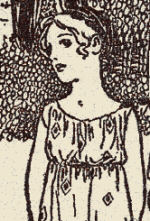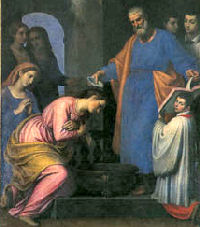Ordinary Time: January 18th
Friday of the First Week of Ordinary Time
Other Commemorations: St. Prisca, Virgin and Martyr (RM)
» Enjoy our Liturgical Seasons series of e-books!
According to the 1962 Missal of Bl. John XXIII the Extraordinary Form of the Roman Rite, today is the feast of St. Peter's Chair at Rome and the commemoration of St. Prisca. The Feast of the Chair of St. Peter in the Ordinary Form of the Roman Rite is celebrated on February 22.
Regarding St. Prisca, the Martyrology reads: "In the city of Rome, the holy virgin and martyr Prisca; after many tortures she gained the crown of martyrdom under Emperor Claudius II (about 270)." Prisca should not be confused with Priscilla, the wife of Aquila, mentioned in the Acts, whose feast dates to the earliest days of Christianity.
The Week of Prayer for Christian Unity
St. Prisca
Prisca, who is also known as Priscilla, was a child martyr of the early Roman Church. Born to Christian parents of a noble family, Prisca was raised during the reign of the Roman emperor Claudius. While Claudius did not persecute Christians with the same fervor as other Roman emperors, Christians still did not practice their faith openly. In fact, Prisca's parents went to great lengths to conceal their faith, and thus they were not suspected of being Christians.
 Prisca, however, did not feel the need to take precaution. The young girl openly professed her dedication to Christ, and eventually, she was reported to the emperor. Claudius had her arrested, and commanded her to make a sacrifice to Apollo, the pagan god of the sun.
Prisca, however, did not feel the need to take precaution. The young girl openly professed her dedication to Christ, and eventually, she was reported to the emperor. Claudius had her arrested, and commanded her to make a sacrifice to Apollo, the pagan god of the sun.
According to the legend, Prisca refused and was tortured for disobeying. Then, suddenly, a bright, yellow light shone about her, and she appeared to be a little star.
Claudius ordered that Prisca be taken away to prison, in the hopes that she would abandon Christ. When all efforts to change her mind were unsuccessful, she was taken to an amphitheatre and thrown in with a lion.
As the crowd watched, Prisca stood fearless. According to legend, the lion walked toward the barefoot girl, and then gently licked her feet. Disgusted by his thwarted efforts to dissuade Prisca, Claudius had her beheaded.
Seventh-century accounts of the grave sites of Roman martyrs refer to the discovery of an epitaph of a Roman Christian named Priscilla in a large catacomb and identifies her place of interment on the Via Salaria as the Catacomb of Priscilla.
—Excerpted from Ordinary People Extraordinary Lives.
Symbols and Representation: young woman with a one or more lions, an eagle and a sword
Highlights and Things to Do:
- Read more about St. Prisca:
- St. Prisca's relics are in the Church in Rome named after her, Santa Prisca. Wikipedia has a few more details.








